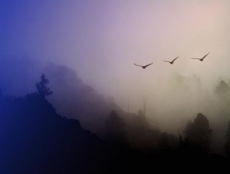
15+
You do not have to be good.
You do not have to walk on your knees
For a hundred miles through the desert, repenting.
You only have to let the soft animal of your body
love what it loves.
Tell me about your despair, yours, and I will tell you mine.
Meanwhile the world goes on.
Meanwhile the sun and the clear pebbles of the rain
are moving across the landscapes,
over the prairies and the deep trees,
the mountains and the rivers.
Meanwhile the wild geese, high in the clean blue air,
are heading home again.
Whoever you are, no matter how lonely,
the world offers itself to your imagination,
calls to you like the wild geese, harsh and exciting --
over and over announcing your place
in the family of things.
This poem by Mary Oliver can, like most poems, be interpreted in many ways. For me, this poem argues that we all have a place in the world – a place ‘in the family of things’. To find this place where we belong, we don’t have to put ourselves through large challenges or try to be something we are not. We simply have to learn to let ourselves love what we love, without trying to stop it or change it. By calling it ‘the soft animal of your body’, Oliver is perhaps drawing attention to the fact that we humans often think of ourselves as something different than animals; we often remove ourselves from our animal sides by attempting such things as to ”walk on your knees for a hundred miles through the dessert, repenting…”. Oliver is suggesting that all we need to find ourselves and be happy is to recognize that we are animals too and we need to be able to love what we love without feeling bad about it or attempting not to love it.
In the second stanza, Oliver is again drawing attention to the contrast humans have created between themselves and nature; we can focus all we want to on our despairs and our hardships, but all around us the world will go on. Perhaps if we again recognize that we are simply parts of nature, not separate from it or above it, we will be able to see our own worries in the perspective of the big world, the grand landscapes and the geese high above.
In the last stanza, Oliver repeats what she has said in the rest of the poem, but instead of writing about the negative effects it can have on humans to think of ourselves as separate from nature, she writes about the benefits of recognizing your place in nature. We constantly have small reminders – described in this poem as the calls from the wild geese above – of our place in the world and that there is no need to think of ourselves as separate from nature, as we will be happier if we think of ourselves as part of it.
What does this poem mean to you? Read through it and leave your comments below with your ideas about what Oliver is saying with this poem.
Image: http://centstoo.blogspot.co.uk/2011_04_01_archive.html

0 Comment:
Be the first one to comment on this article.